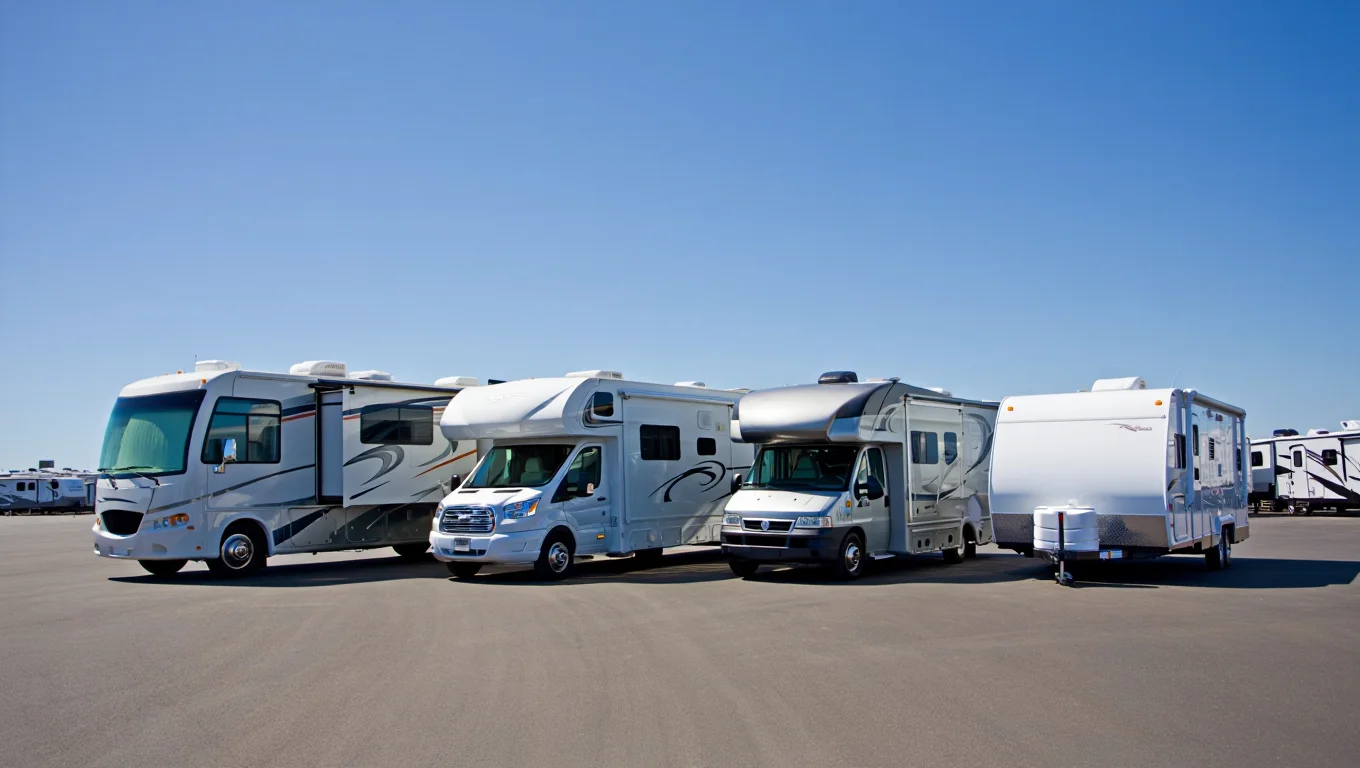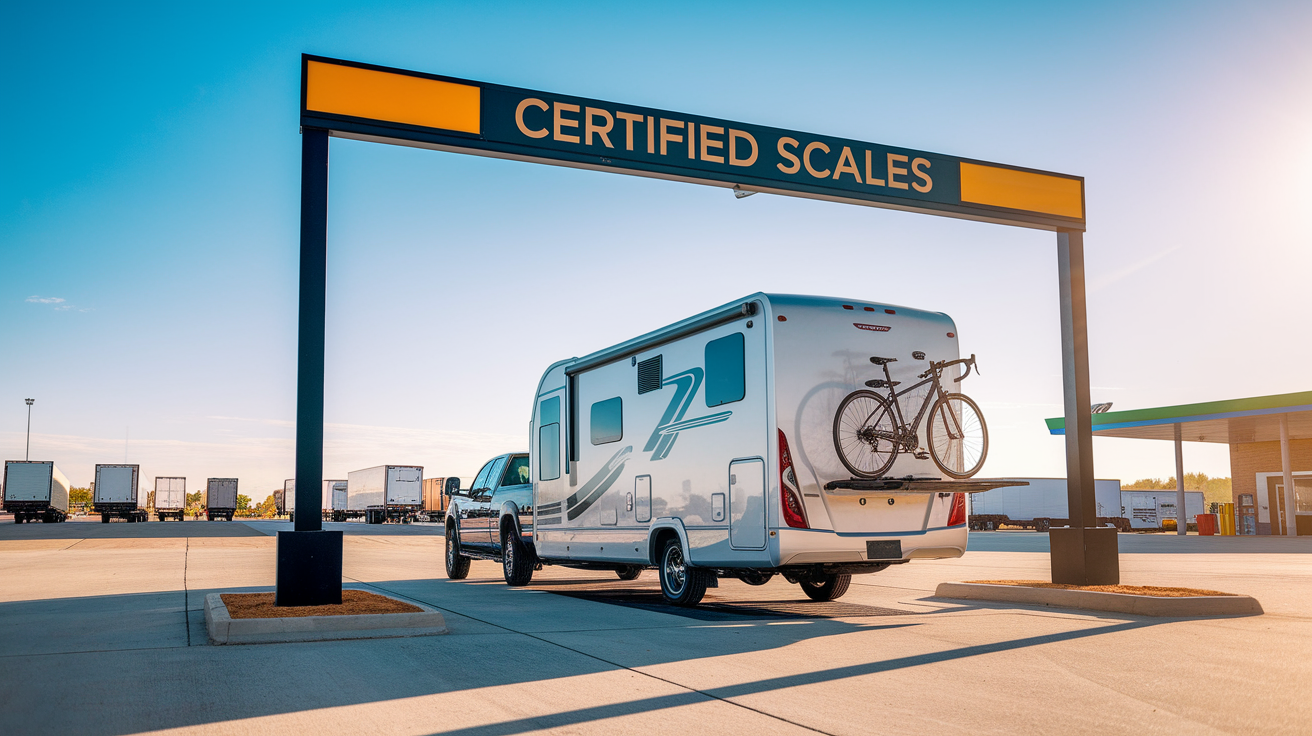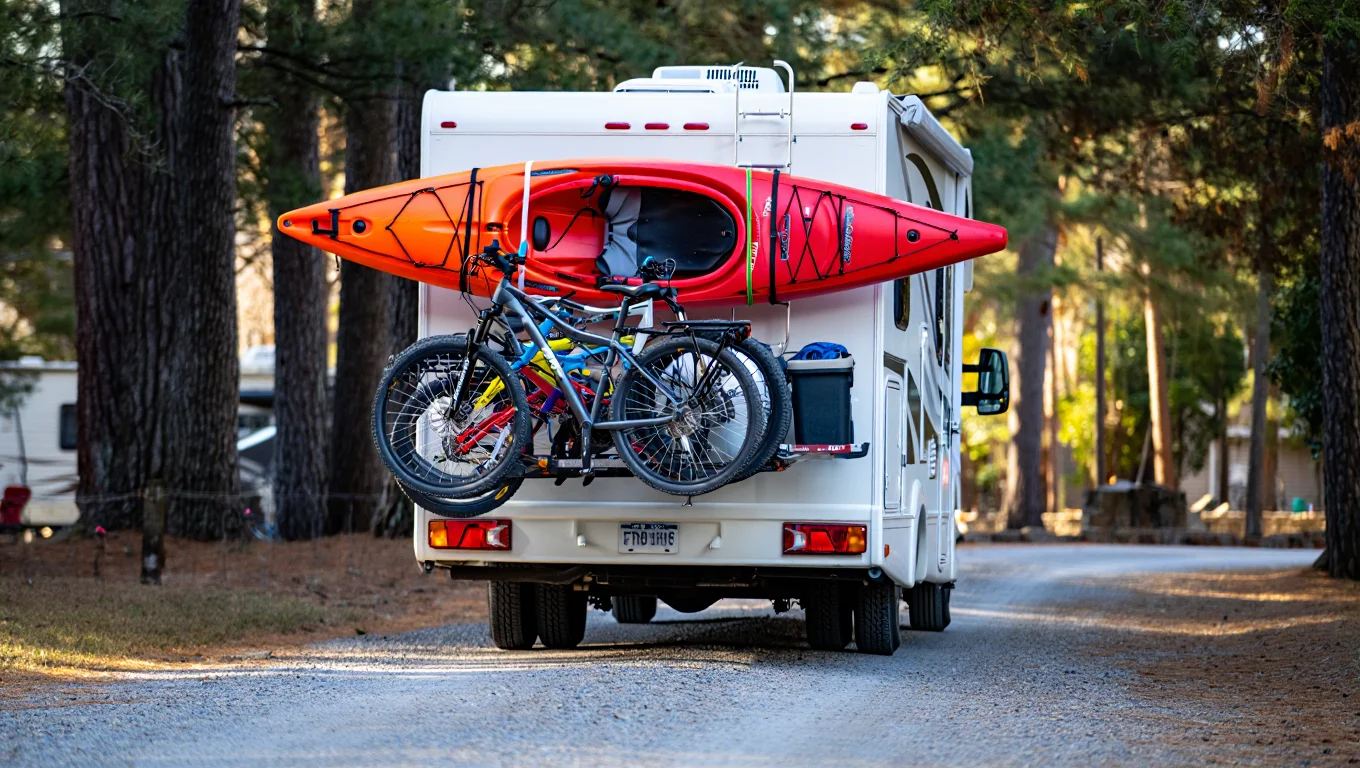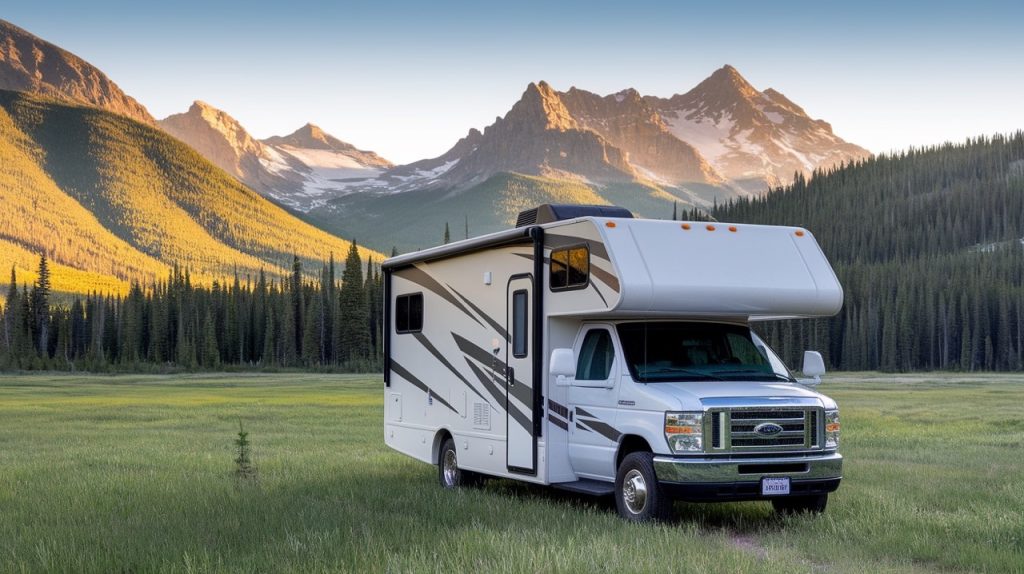Planning an RV trip?
Before you hit the road, you need to know how much weight your RV can safely handle.
Imagine this: The Andersons packed their Class C motorhome with gear, bikes, kayaks, and supplies for a month-long trip.
On their first mountain pass, the overloaded RV struggled uphill, and the brakes overheated on the way down.
Sounds Dangerous, Right? Because it is!
Learn about different weight terms like GVWR, UVW, and CCC, why they matter, how they affect safety and towing, and what the average RV weighs by type.
Understanding these weight ratings helps prevent dangerous situations, ensure compliance with legal requirements, and make traveling safer and more enjoyable for everyone.
What Is RV Weight?
RV weight is how much your recreational vehicle weighs, but it’s not as simple as it sounds!
Think of it like stepping on a scale, but RVs have several different “weights” depending on what’s included.
You might weigh different amounts wearing just pajamas versus wearing winter clothes and carrying a heavy backpack.
RVs work the same way.
There’s the empty weight, the weight with all your gear, and the maximum safe weight.
Understanding these different measurements helps you stay safe on the road and avoid costly mistakes.
Which RV weight measurement confuses you most?
Types of RV Weights
Before hitting the road with your RV, it’s crucial to understand the different weight ratings.
These measurements ensure safe towing and help prevent overloading your vehicle or trailer.
| Term | Full Form / Meaning | Key Features / What It Tells You |
|---|---|---|
| GVWR | Gross Vehicle Weight Rating | Tells you the maximum safe weight of your fully loaded RV. Helps determine legal limits and load capacity. |
| UVW (Dry Weight) | Unloaded Vehicle Weight | Reveals your RV’s empty factory weight. Used to calculate how much gear or weight you can safely add (for CCC). |
| CCC | Cargo Carrying Capacity | Tells you how much gear, water, and cargo you can add. Helps avoid overloading when packing or traveling. |
| GCWR | Gross Combined Weight Rating | Indicates the total weight limit of the tow vehicle + RV/trailer combined. Critical for towing compatibility and power. |
| GAWR | Gross Axle Weight Rating | Shows the load limit per axle. Helps ensure tires, suspension, and axles are not overstressed. |
| Tongue Weight / Hitch Weight | N/A | Measures how much weight the trailer applies to the tow hitch. Essential for tow stability and safe hitching. |
| Pin Weight | N/A | Used with 5th wheel trailers to show weight pressing down in the truck bed. Crucial for truck bed load balance and towing safety. |
NOTE: Always check your RV’s weight ratings before every trip. Knowing these numbers helps prevent sway, breakdowns, and legal issues, making your RV adventures safer and stress-free.
Why RV Weight Matters?

Weight isn’t just a number—it affects safety, performance, and even legal compliance.
- Safe handling and braking rely on staying within weight limits
- Prevents breakdowns caused by overloaded tires, axles, or frames
- Helps maintain fuel efficiency and stability
- Keeps you compliant with road and bridge regulations
- Extends the life of your RV by reducing strain on components
- Improves overall driving experience and reduces driver fatigue
- Prevents swaying and potential rollovers in windy conditions
- Maintains insurance coverage validity in case of accidents
Staying within recommended weight limits isn’t just about following rules.
It directly impacts how safely and enjoyably the RV performs on every trip.
For detailed legal weight limits, refer to your state’s Department of Transportation guidelines or weigh station requirements.
RV Weight By Type

Vehicle weight varies by style, layout, and features.
Use these ranges as a starting point when comparing models.
| RV Type | Average Weight Range (lbs) | Average Empty Weight (lbs.) | Empty Weight Range (lbs.) | GVWR (lbs.) | Average Load Capacity (lbs.) |
|---|---|---|---|---|---|
| Class A Motorhomes | 13,000 to 30,000+ | 22,000 | 13,000 – 30,000+ | 24,000 – 35,000+ | 2,000 – 5,000 |
| Class B Motorhomes | 6,000 to 8,000+ | 7,000 | 6,000 – 8,000+ | 8,000 – 11,000 | 1,000 – 3,000 |
| Class C Motorhomes | 10,000 to 15,000+ | 12,500 | 10,000 – 15,000+ | 14,000 – 18,000 | 2,000 – 4,000 |
| Travel Trailers | 2,500 to 12,000+ | 6,000 | 2,500 – 12,000+ | 7,000 – 14,000 | 1,000 – 3,000 |
| Fifth-Wheel Trailers | 10,000 to 20,000+ | 13,000 | 10,000 – 20,000+ | 16,000 – 20,000+ | 2,000 – 4,000 |
| Toy Haulers | 5,000 to 20,000+ | 12,000 | 5,000 – 20,000+ | 10,000 – 20,000+ | 2,000 – 5,000 |
Weight can vary significantly between individual RVs of the same class based on construction materials, features, and floor plans.
Each individual trailer must be weighed separately to determine its true weight.
Never exceed the lowest-rated component in your towing setup, whether that’s the vehicle, hitch, or trailer itself.
How to Weigh Your RV Accurately?

Knowing your RV’s actual weight—not just estimates—is crucial for safe and legal travel.
Here’s how to weigh your RV step by step:
- Use a public truck scale: Most truck stops or CAT scale locations allow RVs.
Drive onto the scale slowly and follow the attendant’s instructions. - Weigh each axle separately: To get accurate GAWR readings, position each axle on the scale one at a time.
This helps detect imbalances. - Calculate the total weight: Add up the readings from each axle.
Compare this with your RV’s GVWR to ensure you’re within safe limits. - Weigh with and without cargo: Weigh once when empty (to know your UVW) and once fully loaded (to compare with GVWR and adjust if necessary).
- Log the results: Keep a notebook or app-based log to track how different gear and setups affect weight.
Pro Tip: Always weigh your RV when tanks are full and gear is packed for a trip. That gives the most realistic safety baseline.
How to Calculate Weight Capacity?

Managing your RV’s weight helps prevent issues before they start.
These steps can help you stay within safe limits.
- Remove unnecessary gear or clutter before trips
- Spread weight evenly over all axles and compartments
- Avoid installing heavy accessories without considering limits
- Follow compartment ratings to avoid damage
- Weigh your RV when fully loaded at a truck scale before big trips
- Store heavy items low and centered for better stability
- Consider water weight (8.3 pounds per gallon or 1 kg per liter)
- Keep a weight log to track how different loadouts affect performance
- Empty waste tanks before traveling to reduce weight
Managing weight isn’t a one-time task but an ongoing practice that becomes second nature with experience.
The effort put into proper weight distribution pays dividends in safety, performance, and reduced maintenance costs.
Common Mistakes to Avoid

Many RV owners unknowingly follow bad advice or make simple mistakes that can lead to unsafe driving conditions.
Here are the most common mistakes you should avoid:
- Don’t pack just because it fits: Extra weight adds up fast, always check your RV’s cargo carrying capacity.
- Don’t forget about water weight: Water is heavy. A full tank can add over 400 pounds without you noticing.
- Don’t assume your truck can tow anything: Always check your truck’s towing capacity and your RV’s gross vehicle weight rating.
- Don’t load everything into one compartment: Too much weight in one spot can cause poor balance and stress an axle.
- Don’t skip weighing your RV when loaded: Weigh your RV fully packed to avoid going over safe weight limits.
- Don’t ignore tongue weight: Incorrect tongue weight can cause sway or reduce control while towing.
Avoiding these common errors can prevent costly damage, accidents, and even legal penalties on the road.
Final Notes
Proper weight management isn’t just about technical compliance.
It’s about peace of mind during travels.
Respecting weight limits extends the lifespan of the vehicle by reducing wear on critical components, protecting what for many represents a significant investment.
Most importantly, proper weight management protects loved ones who travel in the RV. Taking time before each trip to check weight isn’t just good practice. It’s an act of care for those who matter most.
A well-balanced RV offers confidence on every travel, security in changing road conditions, and the foundation for countless safe travels ahead.
Share your RV weight management tips in the comments!



